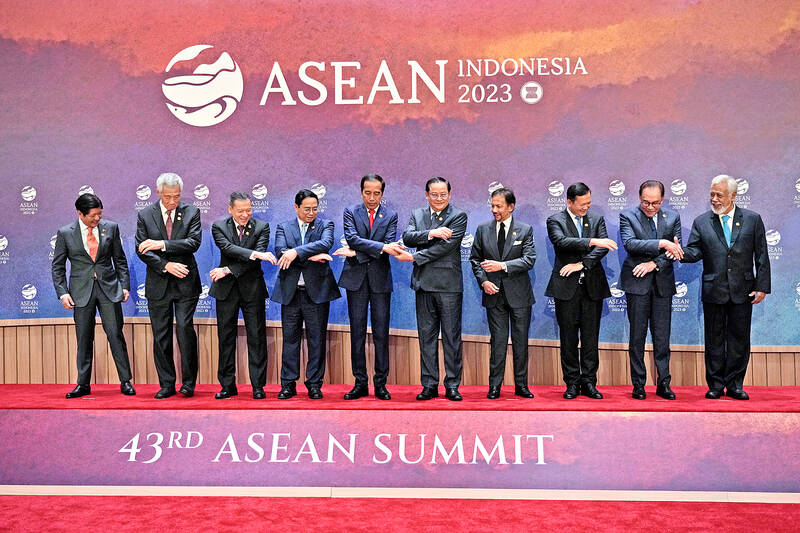Southeast Asian leaders decided that Myanmar would not take over the rotating leadership of their regional bloc as scheduled in 2026, Asian diplomats and a leader said yesterday, in the latest blow to efforts by its ruling generals to gain international recognition after violently seizing power in 2021.
Western governments led by the US have condemned the Burmese army’s ouster of Aung San Suu Kyi’s democratically elected government in 2021 and have demanded her immediate release from years-long detention along with other officials.
The Philippines agreed to take over the bloc’s chairmanship in 2026, Philippine President Ferdinand Marcos Jr said in a statement, citing what he told fellow leaders in the closed-door meetings at the start of the summit in Jakarta yesterday.

Photo: EPA-EFE
“It is my pleasure to announce that the Philippines is ready to take the helm and chair ASEAN in 2026,” the statement said.
Marcos did not explain why Myanmar lost the prestigious year-long ASEAN chairmanship, but two ASEAN diplomats told The Associated Press that it was related to the civil strife in the country and fears that the bloc’s relations with the US and the EU, among other issues, might be undermined because they do not recognize the military-led government in Myanmar.
The diplomats spoke on condition of anonymity because they were not authorized to discuss the issue publicly.
Continuing deadly civil strife in Myanmar and new flare-ups in long-simmering territorial disputes in the South China Sea were high in the agenda of the 10-nation bloc’s talks yesterday.
Thorny issues, including the US-China rivalry in the region, have set off divisions within ASEAN, and Indonesian President Joko Widodo renewed his call for unity.
“All of us are aware of the magnitude of the world’s challenges today, where the main key to facing them is the unity and centrality of ASEAN,” Widodo told fellow leaders.
He likened the regional group to a big ship carrying Southeast Asia’s people.
“ASEAN leaders must ensure that this ship is able to keep going, able to keep sailing,” Widodo said. “We must be captains of our own ships to bring about peace, to bring about stability, to bring about shared prosperity.”

A car bomb killed a senior Russian general in southern Moscow yesterday morning, the latest high-profile army figure to be blown up in a blast that came just hours after Russian and Ukrainian delegates held separate talks in Miami on a plan to end the war. Kyiv has not commented on the incident, but Russian investigators said they were probing whether the blast was “linked” to “Ukrainian special forces.” The attack was similar to other assassinations of generals and pro-war figures that have either been claimed, or are widely believed to have been orchestrated, by Ukraine. Russian Lieutenant General Fanil Sarvarov, 56, head

SAFETY FIRST: Double the number of police were deployed at the Taipei Marathon, while other cities released plans to bolster public event safety Authorities across Taiwan have stepped up security measures ahead of Christmas and New Year events, following a knife and smoke bomb attack in Taipei on Friday that left four people dead and 11 injured. In a bid to prevent potential copycat incidents, police deployments have been expanded for large gatherings, transport hubs, and other crowded public spaces, according to official statements from police and city authorities. Taipei Mayor Chiang Wan-an (蔣萬安) said the city has “comprehensively raised security readiness” in crowded areas, increased police deployments with armed officers, and intensified patrols during weekends and nighttime hours. For large-scale events, security checkpoints and explosives

PUBLIC SAFETY: The premier said that security would be tightened in transport hubs, while President Lai commended the public for their bravery The government is to deploy more police, including rapid response units, in crowded public areas to ensure a swift response to any threats, President William Lai (賴清德) said yesterday after a knife attack killed three people and injured 11 in Taipei the previous day. Lai made the remarks following a briefing by the National Police Agency on the progress of the investigation, saying that the attack underscored the importance of cooperation in public security between the central and local governments. The attack unfolded in the early evening on Friday around Taipei Main Station’s M7 exit and later near the Taipei MRT’s Zhongshan

REBUFFED: In response to Chinese criticism over recent arms sales, Washington urged Beijing to engage in meaningful dialogue instead of threats and intimidation Washington’s long-term commitment to Taiwan would not change, the US Department of State said yesterday, urging Beijing to stop pressuring Taiwan and engage in meaningful bilateral dialogues. The remarks came in response to a backlash from Beijing about Washington’s latest approval of arms sales to Taiwan. The US Defense Security Cooperation Agency said in a statement on Wednesday that the Taipei Economic and Cultural Representative Office in the US has asked to purchase an arms package, including Tactical Mission Network Software; AH-1W helicopter spare and repair parts; M109A7 self-propelled howitzers; HIMARS long range precision strike systems; tube-launched, optically tracked, wire-guided missiles; Javelin